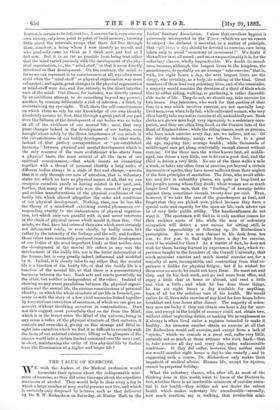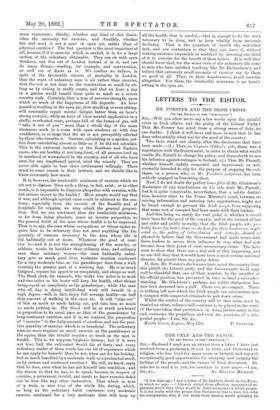THE VALUE OF EXERCISE.
WE wish the leaders of the Medical profession would formulate their opinion about the indispensable mini- mum of exercise, as they did some time ago about the expedient maximum of alcohol. They would help to clear away a fog in which a large number of very useful persons now live, and which is certainly only deepened by lectures such as that delivered by Dr. B. W. Richardson on Saturday, at Exeter Hall, to the
Ladies' Sanitary Association. Unless that excellent hygeist is grievously misreported in the Times—which we see no reason to suspect—he declared it essential, as a matter of principle, that eight hours a day should be devoted to exercise, care being taken only to avoid "monotony of movement !" We doubt if that advice is at all sound ; and most unquestionably it is, for the sedentary classes, wholly impracticable. We doubt its sound- ness, because, although the longest livers in the kingdom, the gamekeepers, do probably on an average " take exercise," that is, walk, for eight hours a day, the next longest livers are the clergy, who certainly, as a body, do nothing of the kind. Great numbers of them lead very sedentary lives, and of the remainder, a majority would consider the devotion of a third of their whole time to either riding, walking, or gardening, a rather discredit- able waste of life. They do not, we should say, take exercise for two hours. Day labourers, who work for that portion of their time in a way which involves exercise, are not specially long. lived men, even when fully fed; while cultivated women, who very often hardly take any active exercise at all, undoubtedly are. Bank clerks are grown men kept very rigorously to a sedentary occu- pation, and they are often long-lived, as the Pension lists of the Bank of England show; while the riding classes, such as grooms, who have much exercise every day, are, we believe, not so. Of the strictly sedentary, many, we believe, live to a good old age, enjoying fair, average health ; while thousands of middle-aged men get along comfortably enough almost without exercise. Of the three men the writer knows best, all middle- aged, one drives a very little, one is driven a good deal, and the third is driven a very little. No one of the three walks a mile a week, or takes any other form of exercise, yet beyond a certain depression of spirits, they have never suffered from their neglect of the first principles of sanitation. The Jews, who avoid athle- tics and live in unhealthy places, Are quite as long-lived as the peoples among whom they dwell; while women are so much longer-lived than men, that the " loading " of annuity tables against them sometimes exceeds twenty-five per cent. Even, however, if we take the case of the gamekeepers as final, and forget that they are picked men, picked because they have a special taste and capacity for the open-air life, such advice can be of very little public utility. The handicraftsmen do not want it. The sportsmen will find in it only another reason for their reckless waste of life, while the men of sedentary occupation will detect a new excuse for sitting still, in the visible impossibility of following up Dr. Richardson's prescription. How is a man chained to his desk from ten a.m. to five p.m. to find eight hours a day for exercise, even if he wished for them ? As a matter of fact, he does not wish for them, having learned by experience the fact, which ex- perience taught to the founders of the Cornell University, that much muscular exercise and much mental exercise are, for a majority of men, incompatible, and contracting from that ex- perience a dislike for physical fatigue ; but if he wished for them ever so much, he could not have them. He must eat and sleep and do his desk-work, and go and come from office, and enjoy a little chat at home or abroad, and read a little and visit a little ; and when he has done those things, be has not eight hours a day available for anything, least of all for the sedulous care of his health. He would rather be ill, than take exercise of any kind for four hours before breakfast and four hours after dinner. The majority of seden- tary men are lucky if they can obtain one hour a day for exer- cise, and except in the height of summer could not obtain two, without either neglecting duties, or making life as unpleasant as it always is when lived under a regimen intended to make it healthy. An immense number obtain no exercise at all that Dr. Richardson would call exercise, and except from a lack of " spirits," which we concede is a great evil, suffer very little, certainly not so much as those artisans who work hard,—that is, take exercise all day and every day, under unfavourable conditions. If they did suffer, however, they neither could nor would sacrifice eight hours a day to the remedy ; and in suggesting such a course, Dr. Richardson only makes them impatient of medical advice. Human life, except for squires, cannot be perpetual holiday.
What the sedentary classes, who, after all, do most of the thinking done in this world, want to know of the Doctors is, first, whether there is an irreducible minimum of exercise essen- tial to fair health—they neither ask nor desire the robust health which makes sedentary life unendurable—secondly, how much exertion, say in walking, that irreducible mini- mum represents ; thirdly, whether any kind of diet dimin- ishes the necessity for exercise ; and fourthly, whether the real need is not a need of open air, rather than of physical exertion ? The last question is the most important of all, because if it is open-air which is needed, it is for a large section of the sedentary obtainable. They can sit with open windows, can live out of London instead of in it and can do many things,—reading, for example, and conversation, as well out of doors as in. We confess we believe, in spite of the favourable returns of mortality in London, that the want of sedentary men is air rather than exercise, that the evil is not done to the constitution so much by sit- ting as by sitting in stuffy rooms, and that an hour a day in a garden would benefit them quite as much as a severe country walk. Certainly, that is true of nervous strength, upon which so much of the happiness of life depends. An hour passed in strolling in the open air, slow strolling, or even sitting, will constantly repair mental fatigue better than an hour's strong exercise ; while an hour of close mental application in a stuffy, overheated room, perhaps full of the fames of gas, will
take it out of you " more than a whole day of the same strenuous work in a room with open windows or with free ventilation, or so large that the air is not perceptibly affected by those who breathe it. Newton, calculating in a garden, suf- fers from calculating almost as little as if he did not calculate. This is the universal instinct of the Southern and Eastern races, who are healthy if not long-lived, of all persons bred up to manhood or womanhood in the country, and of all who have ever, for any lengthened period, tried the remedy. They are never able again to bear close confinement willingly. There must be some reason in their instinct, and we should like to know accurately how much.
It is, however, the irreducible minimum of exercise which we set out to discuss. Does such a thing, in fact, exist ; or in other words, is it impossible to dispense altogether with exercise, with- out serious injury to the health ? Most people would say that it was, and although special cases could be adduced to the con- trary, especially from the records of the Bastille and of hospitals for cripples, we may admit the general proposi- tion. But we are convinced that the irreducible minimum, so far from being absolute, bears an inverse proportion to the general habit of the man whose health is to be improved. That is to say, the man whose occupations or whose tastes re- quire him to be sedentary does not need anything like the quantity of exercise necessary to the man whose life is led habitually out of doors. Whatever the good of exer- cise is—and it is not the strengthening of the muscles, or athletes woula be healthier than ordinary men, and ordinary men than ordinary women—the man habitually seden- tary gets as much good from moderate exertion continued for a very moderate time, as the gamekeeper does from a walk covering the greater part of a working day. He is as much fatigued, repairs his appetite as completely, and sleeps as well. The Bank clerk, for example, who walks two miles in to work and two miles to his home will keep his health, other things being equal, as completely as the gamekeeper ; while the man who all day is doing intellectual work will benefit in a high degree—will, in fact, enjoy full average health—on half that amount of walking in the open air. It will "take out" of him as much as needs taking out, put into him as much as needs putting in. His blood will be as much quickened in proportion to its usual pace as that of the gamekeeper by long-continued exertion, and it is, we contend, the proportion of " exercise " to the daily amount of exertion, and not the posi- tive quantity of exercise, which is so beneficial. The sedentary man no more requires as much exercise as the gamekeeper or the squire, than the invalid requires as much as the man in health. This is, we suppose, hygienic heresy ; but if it were not true, half the cultivated would die at forty, and every sedentary reader of these words has one bit of experience which he can apply for himself. Does he not, when out for his holiday, feel as much benefited by a moderate walk or a protracted stroll, as by serious and continued exertion ? He will, we know, reply that he does, even when he has got himself into condition ; and the reason is, that he has, so to speak, become, in respect of exercise, a permanent invalid, and needs to have exercise doled out to him like any other restorative. That which is true of a week, is also true of the whole life, during which, so long as the sedentary habit continues, very moderate exercise continued for a very moderate time will keep up all the health that is needed,—that is, enough to do the work necessary to be done, and to keep vitality from seriously declining. That is the quantum of health the sedentary seek, and our contention is that they can have it, without making existence impossible or wretched by devoting one-third of it to exercise for the benefit of their bodies. It is well they should know that, for the worst evils of the sedentary life come to men who have imbibed teaching like Dr. Richardson's, and believe that extremely small amounts of exercise can do them no good at all. They, in their hopelessness, avoid exercise altogether. For them, the irreducible minimum is an hour's sitting in the open air.

































 Previous page
Previous page